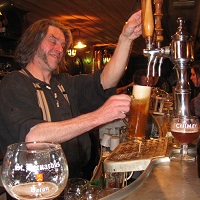
Two hours by train from Paris, in Charleville-Mézières, capital of the French Ardennnes, near the Belgian border, the author glimpses the flight of Arthur Rimbaud, sets out to investigate beer and beer bars and encounters the giant lizard Mawhot.
* * *
Tell a Parisian that you’re heading south into deep France, la France profonde, and, after warning you that you’ll miss Paris after one day, he’ll eventually concede that one can eat well there, mention some magnificent chateau or landscape and finally confess that he has fond memories of once visiting with a friend or lover or cousin. But tell him that you’re headed to the deep France of the north and he’ll look at you with complete bewilderment. His only recollection of France’s northern border is likely to be a collective memory of German invasions.
So when I told friends in Paris that I was going to the French Ardennes, an area that accompanies the Meuse River as it pokes into Belgian forests just west of Luxembourg, I got nothing but a blank stare followed by a stunned “Pourquoi?”
Actually, one friend had been Charleville-Mézières, capital of the French Ardennes. “There’s a beautiful square there,” he said. Still, he thought I needed a better reason to go.
I did: beer. For three days I would set out to meet producers and purveyors of craft beer in the area.
But before taking a swig I had to deal with the ghost of Arthur Rimbaud.
Arthur Rimbaud: the Runaway, the Poet, the Explorer
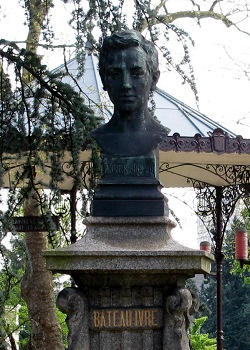
As familiar as I am with the (sparkling) winegrowing area of Champagne-Ardennes, I’d never been to its northern reach, the French Ardennes and its capital Charleville-Mézières, even though it’s just a 2-hour train ride from Paris’s Gare de l’Est station, with a quick change at the Champagne-Ardenne station (near Reims), or an hour’s ride from Reims.
In addition to the aforementioned “beautiful square,” this small city/large town with a population of 50,000 (73,000 with its suburbs) is best known as the hometown of Arthur Rimbaud (1854-1891), a beloved poet of French adolescents.
On a pedestal in the park in front of the train station, a bust of Rimbaud, forever young, indicates the titles of his most famous poems (Bateau Ivre, Voyelles) but refers to him as an explorer in Africa. Rimbaud’s sketchy portrait photograph is used to promote sights and businesses throughout town, exploited for a glory that he would have denied it. Rimbaud fled Charleville at the age of 17, running away from the family home for Paris, where he flirted violently with poets and drank excessively. For several years he returned periodically, mostly against his will, before definitely turning his back on the town at the age of 21.
Coming from a culture that doesn’t know the cult of Rimbaud—young poet in search of freedom—I didn’t intend to write about him along with beer, my primary quest on this trip. But speak with tourist officials and Rimbaud is immediately evoked: the Rimbaud Museum in a former mill over the river; La Maison des Ailleurs (The House of Other Horizons or Elsewheres), the home that he fled; a walk outlined in young Arthur’s footsteps, and his tomb in the family plot of the city cemetery, a half-mile from the Place Ducale—for though Rimbaud stayed away, his remains were returned.
The house where he lived as an adolescent, now La Maison des Ailleurs, stands across the street from the Meuse River. Arthur lived here with his mother and siblings; his father was largely absent during those years.
I didn’t come looking for Rimbaud by the river; I came to find the river itself; I like river towns. I stood across the street from Rimbaud’s house for a good 20 minutes watching water and people go by. It was yet too early in the afternoon to pursue my beer explorations. I had no intention of going inside the house because I’m generally insensitive to the interiors of the homes of artists and especially writers. The more telling view is always outside.
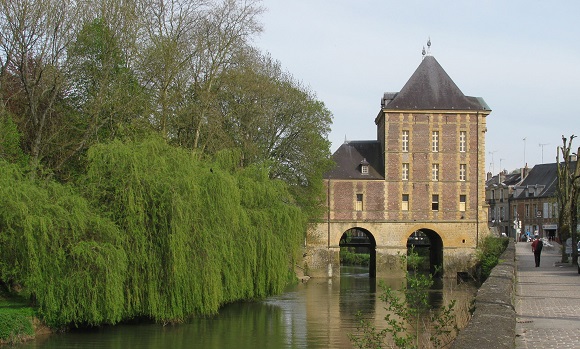
The stone, curtainless House of Other Horizons looked forgotten, forlorn. No one came or went. It appeared to have more ghosts than visitors. I imagined a local association of preservationists and professors fighting to have it classified as a historical monument. I imagined the smirk on the face of the government accountant looking at the budget line for the house from which a young man ran away. I imagined someone at the ticket desk engaged in a game of speed solitaire so as to avoid thoughts of fleeing herself. I felt sorry for the place and for the imagined ticket seller. So I crossed the street and went in.
I wanted the woman at the ticket desk to be happier to see me, a visitor—from afar, no less—, but that was wanting too much. I had an immediate glimpse into Authur’s flight since I was tempted to do the same.
Fully prepared to be let-down upon entering the empty little rooms upstairs, I instead felt inspired by the near-void. Here in the House of Elsewheres, where I was the only visitor, the rooms were empty only in the sense that they lacked furniture and fabric. In their place they presented through sparse images, indecipherable maps and faded walls an invitation to travel. Here, I felt that desire to be away—not necessarily from here but simply to be away, to travel, to discover—to be a part of something else—to be embraced by accomplished poets, to stretch his freedom, to partake in rowdiness, to create poetry, to find soul mates, to find lovers, to create a life, to work in other lands—to explore.
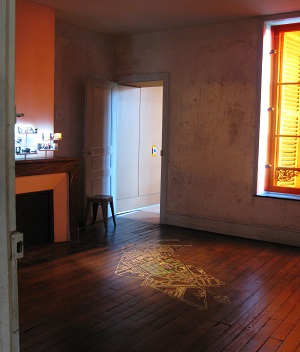
Rimbaud’s most famous poem, Le Bateau Ivre (The Drunken Boat), is a 100-line chef d’oeuvre written in 1871 when Rimbaud was 16 years old, shortly before his departure for Paris. It is the tale of a drunken, driving, rudderless and eventually sinking boat. Rereading it that day, like visiting the house adolescence, didn’t make me want to be 16 again, but it did make me aware of the troubled pleasure of being away from the familiar. I loosely translate four of its lines:
Now I, boat lost in the tendrils of coves,
Thrown by the storm into the birdless air,
I whose drunken carcass coast-guards and merchant ships
wouldn’t have fished from the water…
Or moi, bateau perdu sous les cheveux des anses,
Jeté par l’ouragan dans l’éther sans oiseau,
Moi dont les Monitors et les voiliers des Hanses
N’auraient pas repêché la carcasse ivre d’eau…
Sometimes when traveling we see something, do something, hear, smell or taste something, and we feel a sense of absence or regret—of a person, a place, an age, an activity. Yet sometimes we feel not absence but our own life forces, our own drive to discovery and realization. Here I missed nothing, no one, a most wonderful travel feeling—all is present, all is to come. I liked Rimbaud’s house because I sensed not his presence but his departure, his longing at once solitary and in search of brotherhood. The house was indeed an invitation to elsewheres, which is precisely where I went.
And there I found beer.
Beer bars by the river: Le Baratin and a barge named Mawhot
I returned to the river several times over the next 36 hours. There, along with the absence of Rimbaud I discovered the presence of two notable beer joints.
Two hundred yard to the left of the Rimbaud Museum (the old mill over the Meuse), beyond Rimbaud’s house, I could tell from the moment I walked in to Le Baratin, that I was likin’ whatever was being served on tap at this happy home of craft beer where I was greeted by an eclectic selection of music and firm but friendly owner-barmaids. The evening program can vary from live music to DJ to social events. That evening the DJ was into hoppy and heavy-beat rock ‘n’ roll. The B-52’s’ Rock Lobster played as I was invited to try Agent Provocateur, a nice blond ale brewed in Belgium with American hops by a Scot (Craig Allan) living in Picardy. The music made me want to move my feet. I took my beer for a walk. “Everyone had matching towels…,” went the song. Everyone also had grey-free hair and wrinkle-free smiles.
I liked Le Baratin, but I especially liked the elsewhereness and more age-appropriateness of a barge (péniche) named Mawhot (or simply Le Péniche), about 200 yards on the opposite side of the Rimbaud Museum. For beer-lovers and fans of unusual venues filled with a wide cast of characters and offbeat barman-owners, Philippe Boudard’s beer bar barge Le Mawhot may by itself be reason to visit Charleville-Mézières.
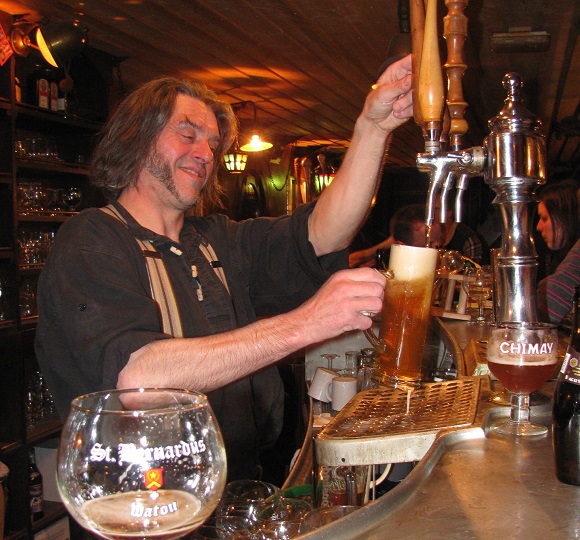
Philippe Boudart, captain of this bar-barge since 1997, looks like Hugh Jackman pouring beer at a 20th–anniversary celebration of the first X-Men, both dangerous and lovable. He and his barge are legendary in Charlie-M’s beer-drinking circles. I stood up to the tin bar in the hold of the old grain barge and introduced myself to Boudart as a traveler in search of a beer education.
“Four Belgians, two Germans and an Irish,” he told me as though he might launch into a long joke. But it was no joke; those were his beer selections for the evening, representing each of the major types of beer, he said. I allowed myself to be introduced me to a dark and aromatic St. Bernardus, from Watou, Belgium, weighing in at a stealthy 10%.
Boudart is a man with great knowledge and firm opinions, though it wasn’t always clear which was which, as is the case with the best mentors. He is a goldmine of information/opinion about the European history of beer and its geographical, technical aspects and religious aspects. Though originally from the Ardennes he doesn’t feel that it’s his duty to up-speak local beer.
Boudart puts down no one but fools. I made the mistake of mentioning the craft beer craze in Paris, and that was enough to set him off on a discourse of authenticity. “I’m a fundamentalist,” he said, berating Paris barmen for cutting the head off their beer. “All they know is fads. The clients [here] have their own opinion on beer. They don’t follow fashion… I serve real beer.” He then gave me a quick lesson on the Trappist beer tradition in the Ardennes, explaining the proximity of Cistercian (Trappist) monasteries producing beer within the enclosure of their abbey walls.
The barge is named Mawhot. Mawhot, Boudart explains, is a legendary giant lizard that lives in the Meuse. When you see him partially that’s good news; when you see him in full that’s bad news.
“Have you seen him lately,” I asked?
“He’s right behind you,” he said.
I turned to see a drawing of lizard eyes peering out from a swamp.
I also saw a man who immediately clinked my glass and told me that we must rejoice in being strangers/foreigners. He was Belgian, it turned out, and drunk. I was reminded of Rimbaud’s Drunken Boat and of Rimbaud himself, having run away from Charleville, an aspiring poet, getting wasted. But Mawhot the bar(ge) is steady under Boudart’s watch, and beer-time for me ended exceptionally cheery and well and somewhat poetic on the deck.
(A French video introduction to Boudart’s beer-barge can be seen here.)
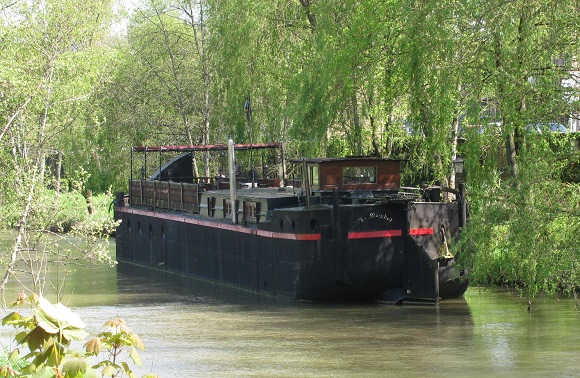
Arthur’s Table and The Squinting Pig
The owners of the restaurant Le Cochon Qui Louche (The Squinting Pig), between Boudart’s barge and the Place Ducale, the town’s central square, have two apparent passions: a desire to share homey fresh cuisine and an interest in second-hand junk/treasures. Regarding the cuisine: tomato soup, goat cheese and chorizo in a fried filo pastry, cucumber and carrot salad; mussels and fries, stewed beef and carrots; crème brulée. Regarding the second-hand items: On the wall outside, the pig (cochon) sign from an old butcher shop; on the walls inside, multiple pigs, boars and brass instruments along with an old squash racket, a great corkscrew, a Mannequin Pis and much more. In this homey restaurant with the atmosphere of a subdued pub, gentle service and a gentle bill complete the picture.
Re-cue Mawhot Le Péniche the following evening before a fabulous meal at La Table d’Arthur (as in Rimbaud). On the ground floor, Arthur’s Table is a handsome wine bar with a nice brasserie menu, yet the greater find is in the vaulted basement, where a finer menu is served. There’s a breezy buzz here, smooth, efficient service (a kind explanation when needed, withdrawal when not), a well-selected and reasonably priced wine list with an emphasis on organic and biodynamic grapes… and quality cuisine—bistronomy at its best. A wonderfully balanced restaurant. If in Paris, every guidebook in the world would be singing its praise, you’d need to reserve a month in advance, you’d pay twice the price or more, and things would go downhill from there. In Charleville, well, you won’t find many guidebooks about Charleville-Mézières—lucky us.
© 2014, Gary Lee Kraut
Continue to The French Ardennes, Part 2: Charleville-Mézières: Place Ducale and the Bare-Ass Casserole
Jump to The French Ardennes, Part 3: The Meuse, Sedan, More Beer and the Big Boar
Addresses and other information, in order of appearance in this article
Charleville-Mézières Tourist Office
4 Place Ducale
08102 Charleville-Mézières
Tel. 03 24 55 69 90
Open Mon.-Sat. 9:30am-12:00pm and 1:30-6:00pm, until 7pm in summer. Also open Sunday in summer.
www.charleville-mezieres.org/indexpc.php
Le Baratin
25 Quai Arthur Rimbaud
08000 Charleville-Mézières
Tel. 06 75 73 05 95
Open Mon.-Sat. 5:30pm-3am. Occasionally live music on Friday.
La Péniche a.k.a. Le Mawhot (Philippe Boudart)
Barge on the Meuse, Quai Jean Charcot
08000 Charleville-Mézières.
Tel 03 24 44 54 35
Open Wed.-Sun. 5pm-1am.
Au Cochon Qui Louche
31 Rue Victoire Cousin
08000 Charleville-Mézières
Tel. : 03 24 35 49 05
La Table d’Arthur
9 rue Pierre Bérégovoy
08000 Charleville-Mézières
Tel. : 03 24 57 05 64
Open for lunch and dinner Thurs.-Sat., also for lunch Mon. and Wed.


Love this piece! Poetry, the poetry of travel, enlightening encounters with locals, “homey fresh cuisine,” and good beer. Thanks for a wonderful vicarious trip into les Ardennes.
I also loved it–especially the musings in Rimbaud’s house. This article humanizes a country so often idealized.